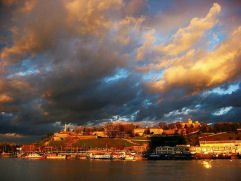
THE BEGINNING OF THE REVOLT AGAINST THE DAHIAS
<background
Serbia at the End of the XVIII Century
After the Austro-Turkish wars at the end of 17-th and in the first half of the 18-th century there was a period of approximately 50 years of peace. It helped Serbs to repopulate the country almost completely devastated in these wars.
Austrians would invariably, sooner or later, retreat. Having helped them, many Serbs would chose to follow, rather than wait for the Turks and their abominably cruel reprisals. As a result wide land areas have been left almost completely deserted up to the mid-18-th century.
In their campaigns of 1787-1790 the Austrians again called many Serbs to their ranks, this time to the point of the Serb 'Freycorps'-units being the main Austrian force in some operations. These units have been well trained and equipped, and many had the Austrian-trained Serb officers, too.
Unlike the other similar occasions in the past, retreating Austrians did something for their Serb allies this time; the Turks signed a peace treaty with a paragraph giving the Serbs an amnesty. Moreover, the Sultan granted the Serbs the continuation of the institutions of the self-government they got from Austrians during their Serbian campaign.
Knez, at the village level, and oborknez at the county level were the Serb dignitaries responsible for the christians in their area. They had to act in parallel with the Turkish Kadi's (judges) and other organs. So, these 'Village knezes' here are Serbs, actually.
The High Porta has many problems in the Belgrade Pashalük at that time. Most of them are caused by the renegades out of their own, Turkish ranks. Some Yenicheri even started a campaign to take over the Pashalük. The Porta and Belgrade have called in the Serb units to help them against the Yeniceri 1793 already; the outcome was an expulsion of the Yeniceri from the Belgrade Pashalük.
The general picture in the Turkish empire was still one of decadence and dissolution going from bad to worse, with the local criminals and renegades taking over the whole provinces. As the time progressed, Yeniceri succeeded in obtaining a permission from the Sultan to return. 1801 they murdered Hajji-Mustapha, the Belgrade Pasha. That was the signal for the start of a reign of terror.
The Yeniceri Dahias, as they titled themselves, re-instituted chitlük, the serfdom, and kuluk, the forced labor. Serb knezina-privilleges have been annuled. The Dahias collected the taxes on their own and were not above robbing the regular Turkish feudal lords of their land and posessions. They instigated the building of the hans (lodging houses) in each village - and by forced labor, how else. These hans then became the objects of the Serbian intense hate, just like this poem shows.
The Dahias disregarded the Turkish judical authorities as well and behaved, in today's terms, just like some very ruthless mafia. Voluntary taxing, robbing, murder and rape were on daily order, to name only some of their favorite activities. Any resemblance to the rule of law in the country vanished.
The number of the Serb outlaws (if there has been any law left) skyrocketed. As Vuk Karadžić notes: 'The same way as the haiduk's were almost not to be heard of in the times of Hajji-Mustapha-Pasha, because of the so much violence and terror, one tenth of the population turned haiduk now.' (Haiduk - Turkish for an outlaw, highwayman)
|